The market for industrial space along Pettengill Road in Londonderry is red hot. Littleton voters approved transferring town-owned land back to the Littleton Industrial Development Corporation to draw even more businesses to its booming park. And Winchester recently secured a federal grant to develop an industrial park as a way to boost the area’s economy. As manufacturers continue to grow in NH, demand for industrial land is strong, but supply remains sparse.
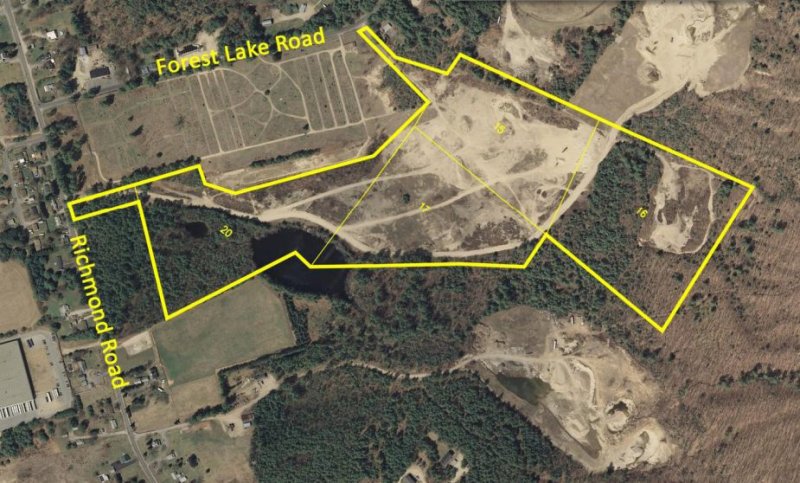
An overview of the proposed industrial park in Winchester. Courtesy of WEDC.
"It is remarkably scarce right now. The industrial market is the tightest that I’ve ever seen it in 34 years,” says commercial realtor Chris Goodnow, founder of Goodnow Real Estate Services in Salem. “These parks are more important than ever in terms of the vitality of the New Hampshire economy.”
Goodnow says the Merrimack Valley region is a hotbed of manufacturing activity, contrary to popular notions that manufacturing has fled overseas. And there are thriving industrial parks across southern NH, he says, including Sagamore Park in Hudson, Pease International Tradeport in Portsmouth, and East Industrial Park in Manchester.
These days, industrial buildings tend to have multiple small business tenants, which Goodnow says is a sign of the state’s “vibrant entrepreneurial environment.” Indeed, they have even drawn some nontraditional tenants. The state’s microbrewery boom has led to some startup breweries setting up shop in industrial parks and buildings, as they have access to public water and sewer and there is room for expansion.
Michael Hauptly-Pierce, co-owner of Lithermans Limited Brewery in Concord, says they decided to establish their brewery at Concord Business Center in 2015 because the industrial space met an 11-point checklist, including proximity to a major highway, electrical supply, plumbing requirements, ceiling height, a loading dock, and a friendly landlord. They also had an option to expand into adjacent space. “We have gone from 1,500 square feet to 6,000 square feet in three years without having to uproot,” Hauptly-Pierce says.
Other brewers have opened in industrial spaces as well. Third Colony Brewery & Winery is housed in a 2,000-square-foot building at East Industrial Park Drive, an industrial hub in Manchester. And while Throwback Brewery is now housed in a renovated farmhouse and barn in North Hampton, it first opened in 2010 in an industrial space.
Berlin is benefiting from the trend of smaller companies taking over industrial space, including in Maynesboro Industrial Park. The city that used to be dominated by one or two large pulp-and-paper manufacturers is now home to much smaller, but growing businesses, says Pamela Laflamme, community development director for the City of Berlin. “It’s helping to create more economic diversity and changes the landscape to one that feels more stable,” she says.
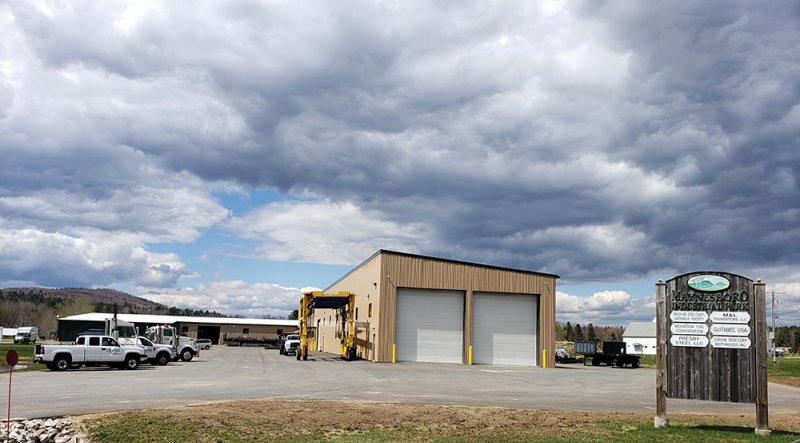
The Maynesboro Industrial Park in Berlin. Courtesy of the City of Berlin.
Among the success stories she points to is Capone Iron, a Massachusetts steel manufacturer that opened a second location in Berlin that has since added space and jobs. An automotive parts manufacturer took over another defunct manufacturing building in the city and the owners of the Cog Railway converted another industrial space into a repair site for its trains, Laflamme says.
The industrial park now houses seven businesses with one vacant building as well as some available parcels, Laflamme says, adding that there are indications of new investment coming.
Industrial Rents Rising
According to Colliers International, which tracks about 67.7 million square feet of industrial space across six submarkets in southern NH, vacancy for industrial space has held steady at 5.4 percent in the first quarter year-over-year, while rents have grown to $7.14 per square foot (excluding operating expenses), which is up 35 cents per square foot from last year.
Industrial properties outside of industrial parks are in demand as well. Colliers’ Q1 2019 report notes that there were a number of significant industrial sales in the state during the first quarter, including an investor purchasing the 77,000-square-foot industrial building at 80 Ross Ave. in Manchester for $4.1 million in March as well as the YMCA of Greater Nashua purchasing a 57,000-square-foot industrial building for almost $5 million at 90 Northwest Boulevard in Nashua. In Concord, “MetalMax, a Tennessee-based metal fabricator, purchased the 20,970-square-foot general industrial building at 28 Locke Road for $1.6 million ($76.30 per square foot) in February. Down the street, a New Hampshire-based investor purchased 38 Locke Road for $1.95 million ($65.44 per square foot) at the end of February,” Colliers’ report states.
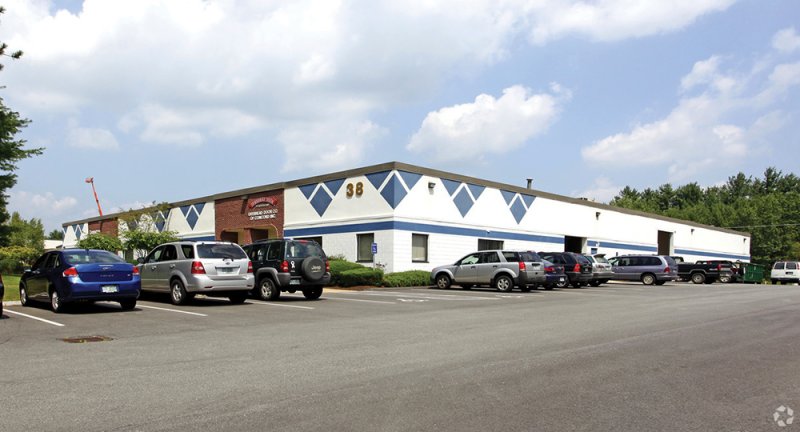
38 Locke Road in Concord was purchased for $1.95 million. Courtesy of Colliers International.
The report states while industrial leases have not been as robust, this is not an indication that the market is slowing but is rather the result of the low vacancy rates and “lack of desirable inventory.”
However, Goodnow says the industrial vacancy rate in Salem is less than 3 percent due to significant economic activity there, including growth in the Commercial Avenue area. Salem, which has about 30,000 residents, has the third or fourth highest tax assessment in the state due to the influx of commercial enterprises, he says. Colliers’ report highlights Nordson MEDICAL, a medical devices and component technologies company with 60,000 square feet of space at 29 Northwestern Drive in Salem, expanding its footprint by “moving some of its manufacturing, warehouse, and office space into 25,000 square feet of space at 21 Northwestern so it could add more clean rooms to its original building.”
Demand in the metro Boston and southern NH region is particularly acute for high-bay warehouse and distribution buildings larger than 500,000 square feet.
Londonderry’s Boom
Among the communities reaping the rewards of the increased demand for industrial space is Londonderry, Goodnow says. “Londonderry has the fastest single growing park in the state just south of the airport,” he says.
Proximity to a highway is critical for all industrial parks, he says, but Londonderry also benefits from nearby Manchester Boston Regional Airport. Londonderry has some of the most developable land in the state to boot, according to Town Manager Kevin Smith, who also serves on the Pease Development Authority board of directors. “We’re probably close to two million square feet now just on Pettingill Road,” Smith says. Half of that is the one-million-square-foot F.W. Webb distribution center.
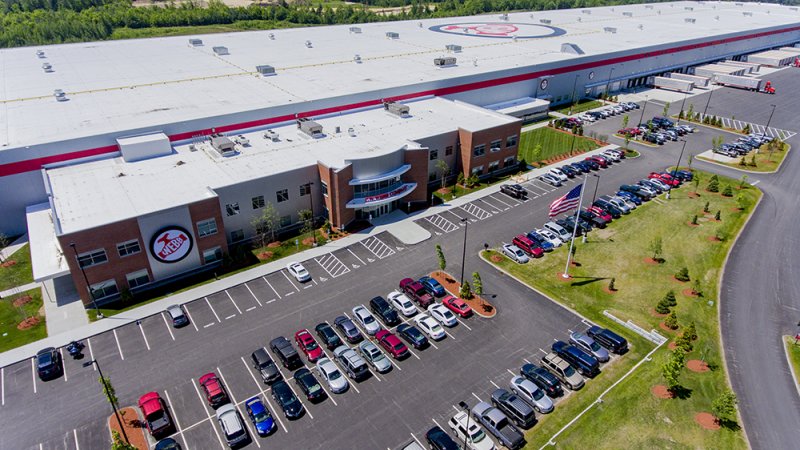
The one-million-square-foot F.W. Webb distribution center in Londonderry. Courtesy photo.
Among the area’s draw is flat land that doesn’t require much site work to develop, Smith says, and since the cost to build is much higher than the cost to buy existing property, every chance to save on construction is a factor for a developer weighing their options.
Goodnow estimates that it costs about $100 per square foot to buy industrial property, but it costs closer to $160 to $170 per square foot to build an industrial space.
Developers are also likely to shy away from projects with residential abutters who may oppose a project before a local land use board, Smith says. But the Pettingill Road area near the airport has few residential abutters, which he says is one of the reasons the area has been so desirable.
Investing in Parks
Other communities are looking for ways to expand their industrial parks or create new ones through rezoning, tax districts and infrastructure upgrades.
Derry Town Planner George Sioras says Derry has been fortunate to have several successful industrial parks. “They are vital to the town’s economy and provide much-needed tax relief and help expand our nonresidential tax base, as well as creating several hundred jobs in the community,” Sioras says.
But lately those parks, many of which were built in the 1960s and ’70s, have reached capacity, thanks in part to a revitalization effort. However, Derry remains a predominantly residential community, and town officials are seeking to attract more businesses to alleviate the tax burden on residents. The town is looking to redevelop industrial areas around Manchester Road. Sioras says the hope is that the new Exit 4A off Interstate 93, which will be constructed in the next few years, will create new opportunities for development and spark new interest among companies to locate there.
“The planning board also is currently working on zoning changes in this area to provide for additional parcels of land for future industrial and commercial development,” Sioras says.
In Hudson, a recent study by the Nashua Regional Planning Commission identified more than 5 million square feet available for industrial use. However, it would require the city to invest in roadway improvements and new sewer and water infrastructure to make projects viable.
Tax increment finance (TIF) districts have proven a useful method for local communities like Derry and Londonderry to invest in infrastructure by redirecting additional tax revenue from a new development until the cost of the infrastructure is paid off. Developers like it because they don’t have to pay for the infrastructure, and communities opt for the short-term sacrifice in favor of long-term tax base expansion.
Smith says the Pettengill Road area was jump-started by a TIF district. He says communities need to think outside the box to help attract new industrial development. “It takes some creative thinking. It takes some forward thinking as well,” Smith says.
Rural communities are also investing in industrial parks. In late 2018, Winchester was awarded a $666,000 grant from the U.S. Department of Commerce’s Economic Development Administration to create roadway, sewer and water infrastructure improvements needed to establish a manufacturing-focused industrial park.
Mark Tigan, board chairman of Winchester Economic Development Corporation, told Business NH Magazine earlier this year that the project is expected to create 243 jobs and generate $19 million in private investment. He says that effect on the economically disadvantaged region is a major reason the project secured federal funding. The 24-acre site is the first phase of a 63-acre industrial park, and when completed it is estimated that the park will be built out to 120,000 square feet of industrial space within nine years.
The town of Littleton has been experiencing an economic boom in recent years, including new activity within its industrial park. In 2016, Littleton Industrial Park saw two major expansions: Tender Corporation, makers of insect repellent and first-aid remedies, broke ground on a 117,250-square-foot new facility; and Robotec, a manufacturer of grapples and material handlers, broke ground on a 23,000-square-foot expansion.
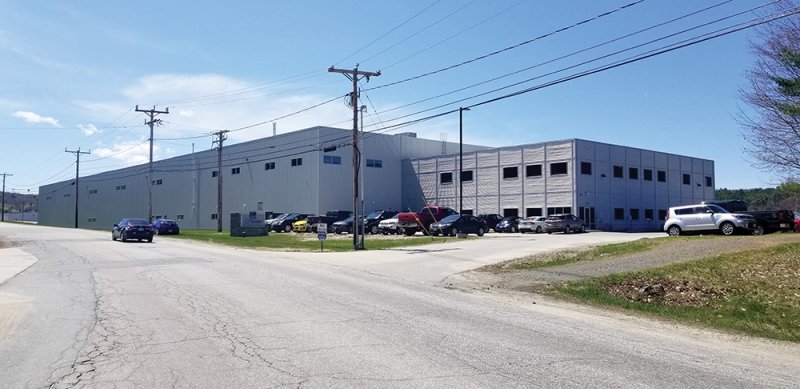
Tender Corporation's 117,250-square-foot facility in Littleton. Courtesy of Littleton Industrial Park.
Last year, voters at town meeting approved transferring 42 acres of land the town owned in the middle of the industrial park to Littleton Industrial Development Corporation (LIDC), which operates the park. In late 2018, the LIDC received a $119,500 grant from the Northern Borders Regional Commission to complete engineering work on that parcel. The hope is to build a “rough” road for the parcels and develop seven to nine industrial lots.
“This is one of the best opportunities we have now to expand the industrial park,” says Greg Eastman, president of the LIDC. Eastman says the LIDC works closely with the NH Department of Business and Economic Affairs to attract businesses to its community, including Canadian companies seeking to expand in the U.S. The park is a huge economic driver for Littleton. “Two years go we surpassed the $10 million mark in real estate taxes paid,” he says of the park, adding wages paid by companies at the park total an estimated $60 million to $80 million annually, which results in $180 million to $240 million in annual economic activity in the region.
It’s not just businesses the park is seeking to attract. The 380-acre park is home to 18 companies that employ an estimated 1,800 people, Eastman says, explaining that most of them are at full employment and many are eager to hire more. A group of businesses at the park are banding together to find ways to work cooperatively to promote employment opportunities there.
The group, which began meeting in late April, is developing an event with the Littleton Area Chamber of Commerce to be held in the Fall. The event will educate people about jobs available at the park and resources they can access in the community, says Carol Stevens, director of human resources at Littleton Coin Company, one of the largest employers in the park.
“Most of us are in the same boat. We need qualified people. We feel the industrial park could benefit from more community awareness,” she says, noting people come to the park for specific reasons and don’t pass it in their daily lives like they might pass businesses on Main Street. “It’s a little out of sight, out of mind. We want an opportunity to tell our story.” Organizers hope the event will attract area residents, visitors who may consider relocating, as well as high school seniors and recent college graduates. The group is also considering forming a coalition to cross-refer job applicants, Stevens says.

 Current Issue - April 2024
Current Issue - April 2024